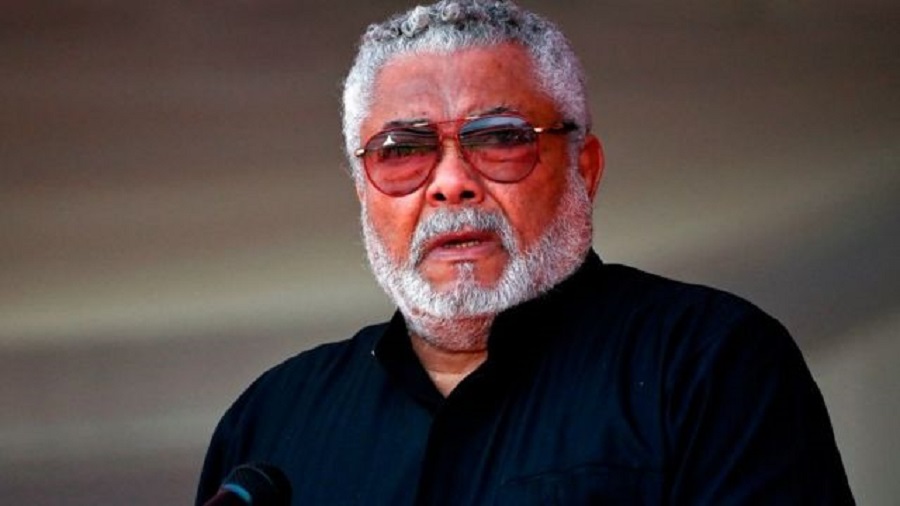Jerry Rawlings 1947 – 2020
Even at 73 and over two decades out of power, news of the death of a former Ghanaian leader, Jerry Rawlings, sent shock waves across Africa and several parts of the world. He died in a Ghanaian hospital due to complications from a medical condition traceable to the dreaded COVID -19. By Rawlings’ death, Ghana, […]

Even at 73 and over two decades out of power, news of the death of a former Ghanaian leader, Jerry Rawlings, sent shock waves across Africa and several parts of the world. He died in a Ghanaian hospital due to complications from a medical condition traceable to the dreaded COVID -19.
By Rawlings’ death, Ghana, and indeed Africa, have lost not just a leader, but an uncommon voice of reason that was committed to charting a credible path of progress for the continent. His vision for Ghana, although pursued in a rather drastic fashion, not only changed the country for good, but actually inspired many non-Ghanaian Africans to contemplate if such should not be replicated in their own countries, especially when such intervention offered uncommon and fresh perspectives to national politics.
- EX-Ghanaian President Rawlings dies of coronavirus
- Harassment: FG mulls evacuating Nigerian traders from Ghana
Rawlings was born in Ghana on June 22, 1947, and commissioned into the Ghanaian Air Force in 1969, having excelled as the winner of the prestigious Speed Bird Trophy as the best flying officer in his squad. On June 7, 1979, now a flight lieutenant, Rawlings along with several other junior military officers, was arrested for staging a coup detat to take over the military government of General Fred Akufo. For their failed attempt, they were tried and sentenced to death by firing squad.
However, while awaiting execution, the detainees were freed by their colleagues who assisted them to re-launch the coup attempt, and this time, they succeeded. Following the success of the second attempt, the coupists established the Ghanaian Armed Forces Revolutionary Council (AFRC) in which Rawlings served as Chairman and Head of State of Ghana. The AFRC claimed inspiration from the country’s foremost leader, Kwame Nkrumah, and directed its enterprise towards purging corruption in the country’s government and military circles – which led to the public execution of several government officials, including two former military Heads of State: Generals Fred Akufo and Ignatius Kutu Acheampong.
In a development that differed from the sit-tight tendency of military governments in Africa, Rawlings and his AFRC opted to leave the stage just when the ovation was loudest as they spent just 112 days in power and voluntarily relinquished power to a democratically elected President Hilla Liman on September 24, 1979, and Liman promptly retired Rawlings from the military.
However, after two years of floundering governance by the Liman administration, Rawlings returned from retirement to stage a successful takeover of government from the incumbent who he jailed along with over 200 other public officers who were indicted for corrupt practices. Rawlings then ruled Ghana as Chairman of the National Provisional Defence Council (NPDC) from December 31, 1981, to January 7, 1993, during which he implemented a cocktail of economic policies which earned for the country some of the highest economic growth rates in Africa of the 90s. The turnaround of the Ghanaian economy built so much popularity for him to be democratically elected into office as president for two consecutive terms and he ended up as the longest serving head of state in Ghana, having been in office for a total of 20 years as both military leader and civilian president.
Against the backdrop of the foregoing, it is indisputable that Rawlings’ enhanced rating among African leaders draws significantly from the monumental impact he wielded on the politics and economy of Ghana, which has inspired a domino effect on other African countries, especially Nigeria, which shares so many historical ties with Ghana.
Even as history may see his advent into the terrain of politics as through the unconstitutional process of coup detat, not a few political observers have also considered the argument of the end justifying the means, and accorded his political journey as beneficial to his country.
As Ghana and Africa rue the death of this remarkable son and leader, this newspaper lends its voice to console his family over their loss and prays for sweet repose of his soul. Adieu, Jerry Rawlings.
